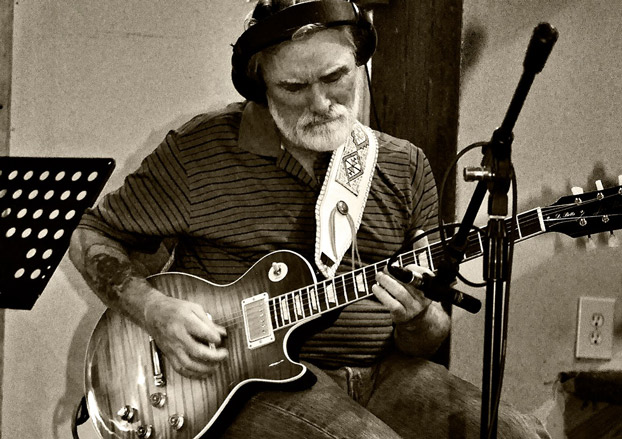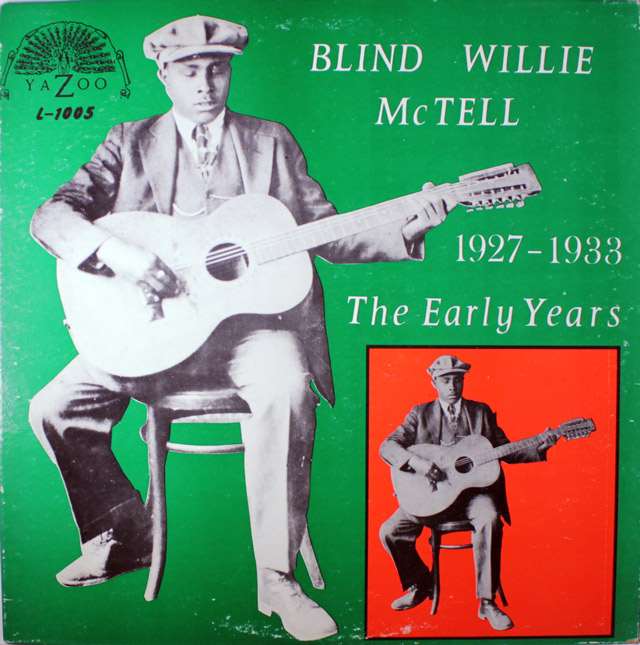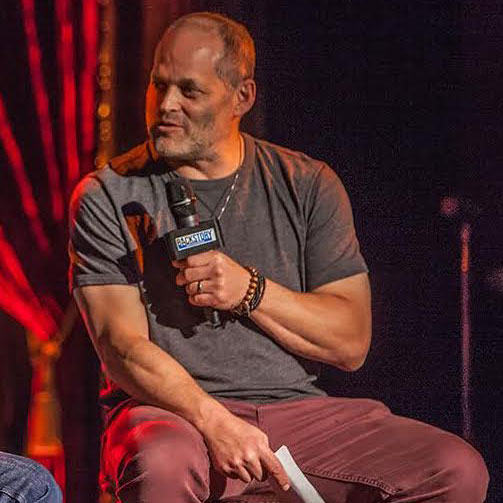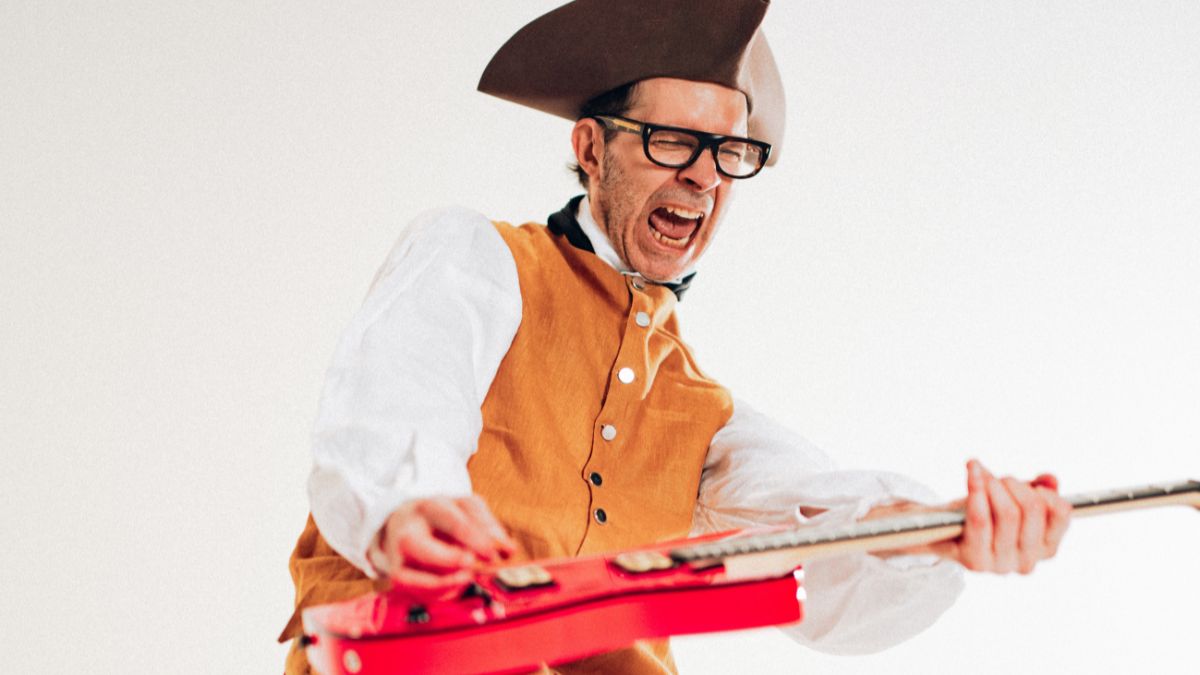All the latest guitar news, interviews, lessons, reviews, deals and more, direct to your inbox!
You are now subscribed
Your newsletter sign-up was successful

Acoustic fingerpicker Joshua Jacobson scored quite a coup on his wonderful debut album, Good Little Thing, getting Dickey Betts to play on a cut.
The Allman Brothers Band founding member has been laying low in semi-retirement at his Florida home for a few years. Jacobson, who lives in rural Georgia, explains how a mutual love of Blind Willie McTell helped him bond with Betts—and how he came to own of the guitar legend's 1930s Gibson L-00.
Congrats on having Dickey Betts appear on your album. How did he end up playing on “Pistol Packin’ Papa”?
I met Dickey through a mutual friend who Dickey calls "Luke the Drifter." Luke called me years back and told me he was cooking for Dickey at his Myakka River party [in Florida] and told me if I ever wanted the chance to meet the cat, this was it.
I flew down and Luke called Dickey at home to tell him he had a friend coming who plays “all of that Robert Johnson and Blind Willie McTell stuff.” Dickey told him to come on over, and we showed up with a 5-gallon bucket full of Bud and my old Stella 12-string.
We did that whole back-and-forth thing where he’d play a tune and then I’d play one. He played “If I Had Possession Over Judgment Day” with a slide and I was floored! Here I am in my hero’s house and he’s playing stuff live I’ve never heard him do! Then he tells me to play something. These old school cats, the Great Ones, they ain’t fooling around, so I just put it all on the line and played McTell’s “Southern Can Is Mine.” Dickey said I sounded great but that I really needed to start writing my own songs.
About one year later I drove up to Nashville to see his band play and I propositioned him. I said I’ve been writing my own tunes, whipped out my new Fraulini and played “Baby’s Mama Really Don’t Care,” the latest one I’d written. I got to the part about meeting her auntie down at the Piggly Wiggly, and Dickey chuckled. I told him I’ve got enough to record an album and asked if he’d play on it. He agreed, as long as we did it down at the Spirit Ranch recording studio in Myakkam, so we did.
“Pistol Packin’ Papa” is way different from all of the other ones on the album. I had written it in more of a Piedmont style, much like Blind Blake’s “Hard Pushin’ Papa.” Scott Cable, the producer, suggested we record three or four tunes for Dickey to listen to before tracking. Dickey shows up, listens to “Katie” and says he hears slide on it. Then he listens to “Good Little Thing” and doesn’t care for that one either. Then Scott suggested we play “Pistol Packin’ Papa” with a different tempo in a shuffle and showed me on the guitar. I thought the cat was really screwing up my song but Dickey listened to it, liked it and got on the album.
All the latest guitar news, interviews, lessons, reviews, deals and more, direct to your inbox!
Man, if it wasn’t for Scott Cable, Dickey Betts wouldn’t be playing on my album!
What was the experience of working with Dickey like?
It was really a dream come true. The Allman Brothers have been my favorite band since I was 14 and heard “Melissa.” He was really straight-forward with his expectations about what he would like to play and was willing to help me in any way he could. I’ve heard all the jive and here-say about Dickey, but he’s been nothing but kind to me. As far as I’m concerned there ain’t one bad word to be said about Dickey Betts. He’s a stand-up guy and that’s more than I can say for most people.
I’ll give you an example. I forgot my travelling cigar humidor at his house one time. He was taking a tour up the East Coast about a half a year later; I showed up in Atlanta and after the show Dickey says he’s got something for me. He walks to the back of the bus and handed me my travelling cigar humidor. I couldn’t believe that after all this time he remembered! People who are selfish and self-centered don’t have the capacity for empathy, but Dickey does. He’s a very kind and thoughtful man; a real stand-up cat.
We’ve gotten together and played a little off and on. Dickey invited a few folks over after one of the Myakka parties on the river and we got back to his place before everyone else. He asked about the sound that night and I told him how much I really liked his tune, “Nothing You Can Do.” So Dickey reached over and picked up his flat top and started belting the tune out. So I reached over and grabbed Dickey’s old Twenties or Thirties National Tricone that he said Elvin Bishop gave him, and I started playing slide on it. And with slide you don’t really even have to know what the chords are, you can just play in the box-style pattern like Duane did.
- I was just enjoying playing, not paying attention to the chord changes and Dickey stops playing rhythm and starts playing lead! I had to figure it out on the spot and I guess I got it right because he didn’t throw his guitar down and leave! But those old cats, man, you’ve really got to toe the line with them, and there’s this unspoken thing where they really kind of demand the very best from you and you’ve got to either step up or step down. He plays an electric blues solo here, of course, but he is also a fine and very interesting acoustic picker.
Above: Joshua Jacobson and Dickey Betts (Photo: George Mitchell)
Have you talked about his favorite players?
Every time I see him he gives me the name of someone who I haven’t heard of that he says I need to check out. But for blues, country and jazz, his tops would be Blind Willie McTell, Robert Johnson, Billy Joe Shaver and Charlie Parker. I think the first time we got together we talked about the Bird for nearly an hour. And if you listen to Dickey’s playing, he’s all about playing the melody just like the Bird did. Nobody in rock and roll plays the melody like Dickey does. He is the Charlie Parker of rock.
We talked about the movie Clint Eastwood directed, Bird. Dickey referenced the part of the movie where a young Parker got up the guts to jam with some guys, didn’t change keys with the band so the drummer throws the symbol out on the floor and the music came to a crashing halt. Well Dickey said a similar situation happened to him. He was up in Jacksonville playing some of these bottle shops that would stay open until the wee hours of the morning where you bring your own booze in and check it and they sell you a mixer for your drink.
So Dickey said Stix Hooper, the drummer for the Jazz Crusaders, comes in and invites him to a jam that he has across town. Dickey said Stix warned him from the beginning and told him that he had to be cool and if he got up there hot-dogging it then these cats would go sit down on him. Dickey said he got up and started playing and was really wearing it out. The next thing he knew he looked out in the audience and saw their guitar player sitting at a table having a drink and smoking a cigarette. Then Dickey said he noticed another guy walked off the stage. By the time he finished his solo Dickey said he was the only guy up on the stage. So Dickey said he learned his lesson after that!
Where can people see you play? Buy your CD?
I got a lot of things up in the air right now—and I’m actively looking for a publicist and booking agent, so anyone who fits the bill should get in touch! I’m in the process of setting up a CD-release party for the end of next month in Atlanta which I’ll post on my website once it’s final. Or you can follow my Facebook page for updates.
Also Pedro Arevalo, Dickey’s bass player, and I are trying to put a tour together. Pedro’s a great acoustic player, a hell of a musician and just a stand-up cat. I can’t think of anyone else I’d rather go out on the road with. Hopefully, we’ll be starting something up within the next two or three months. And people can purchase the CD from the website and look for us when we’re in your area.
Tell us about the beautiful acoustics you play. The Fraulinis look gorgeous; are they the modern version of Stellas? You also play a vintage Stella, right? Talk about both of these guitars and what makes them special for what you do.
I bought an old Yamaha 12-string that I started trying to learn Blind Willie McTell on, but it just didn’t cut the mustard. You know when the folk revival thing came around in the Sixties, they started making 12-string guitars that sounded like harps; they just didn’t have the bottom end punch that those old Stella jumbo 12-strings did. So I bought an old jumbo Stella 12-string, and that really put the fire in my playing to learn all of those old McTell tunes. It’s a great-sounding guitar, but it’s not really road worthy and the top is buckling so it needs a little TLC. And the fretboard is massive! It’s big enough to land an aircraft on and playing it is like playing a flight deck!
So I did a ton of research and reading reviews from people who owned new guitars made like the old Stellas, and everyone was singing the praises of this luthier, Todd Cambio, in Madison, Wisconsin. So I talked to him, and he was so confident he gave me the names of some well-known players who used his guitars. They all spoke well of Todd and his Fraulinis, so I pulled the trigger on it and had him install a Pure Western pickup, which sounds great! It’s got the bottom end that those old Stellas had, and he braces them with ladder bracing just like they did with the Stellas, so it sounds amazing! When I played it for Dickey on the bus his exact words were, “That sounds better than your old Stella does!”
If you look for those Fraulini’s used online, you can’t find one. And if you want to order one, Todd’s got a waiting list. And Todd’s not an uptight traditional luthier; he questions conventional methodologies and isn’t afraid to try something new. He’s all about quality improvement and trying to get closer to the original sound; he’s a real purist.
You know he’s building a new line of Fraulini’s like the decalomania, much like the one McTell is pictured with on The Early Years [see below] with that decal beneath the sound hole. He built a line of them, posted them online and sold them in less than one week and had a waiting list three deep in case the buyers backed out at the last minute. I’m looking to sell my Fraulini 12-string so I can purchase another 12-string for the road and an additional six-string, and I think that will make my Holy Grail search for guitars quest complete.

The six-string with the killer tone that you hear on “Katie,” “Pistol Packin’ Papa” and the opening notes on “Twerkin’ Lil’ Mama” is an early Thirties model Gibson L-00. I played with Cora Mae Bryant for several years, and she always told me that the only guitars she saw her dad, Curley Weaver, and his playing partner, Buddy Moss, play was a Gibson, both L-00’s. So playing with her and playing her dad’s music, I’ve always wanted a Gibson. Well Dickey said he had three L-00’s Gary Stewart had given him; he had that country hit out in the seventies “She’s Acting Single and I’m Drinking Doubles.”
I was joking around with him one day and said, “Well hell! You ought to give me of ‘em them!” Dickey replied, “If the Lord keeps telling me to, I’m going to have to.” So I went and saw him up in Chastain a few years back and he told his guitar tech to grab that guitar for him. He opened the case strummed it and then handed it to me. I think the world of that man and he knows I love him; not one bad word to be said about Dickey Betts.
Then he told me I needed to put a rattler from a rattlesnake down in the box to keep any rodents away. I remember thinking, “Come on, Dickey, I don’t live on no damn farm!” But what do you do when Dickey Betts tells you to put a rattler in your box? You go on eBay and purchase one!Alan Paul is the author of One Way Out: The Inside History of the Allman Brothers Band.
Alan Paul is the author of four books, including Brothers and Sisters: The Allman Brothers Band and the Inside Story of the Album That Defined '70s as well as Texas Flood: The Inside Story of Stevie Ray Vaughan and One Way Out: The Inside Story of the Allman Brothers Band – both of which were both New York Times bestsellers – and Big in China: My Unlikely Adventures Raising a Family, Playing the Blues and Becoming a Star in Beijing, a memoir about raising a family in Beijing and forming a Chinese blues band that toured the nation. He’s been associated with Guitar World for 30 years, serving as managing editor from 1991 to 1996. He plays in two bands: Big in China and Friends of the Brothers (with Guitar World’s Andy Aledort).

